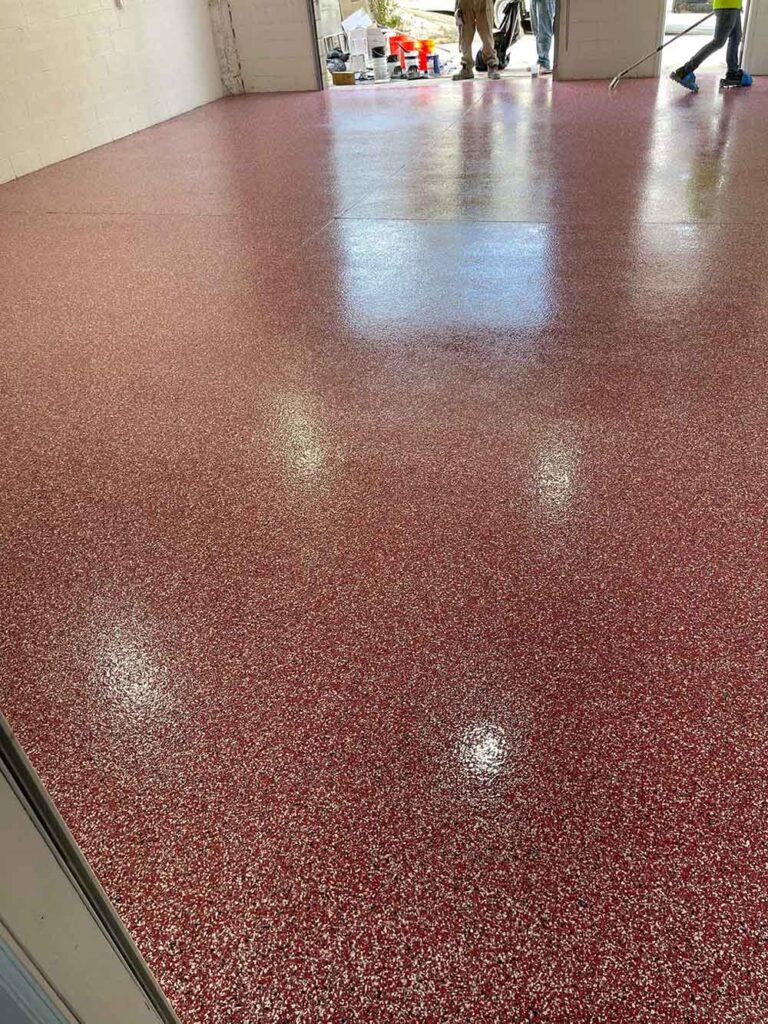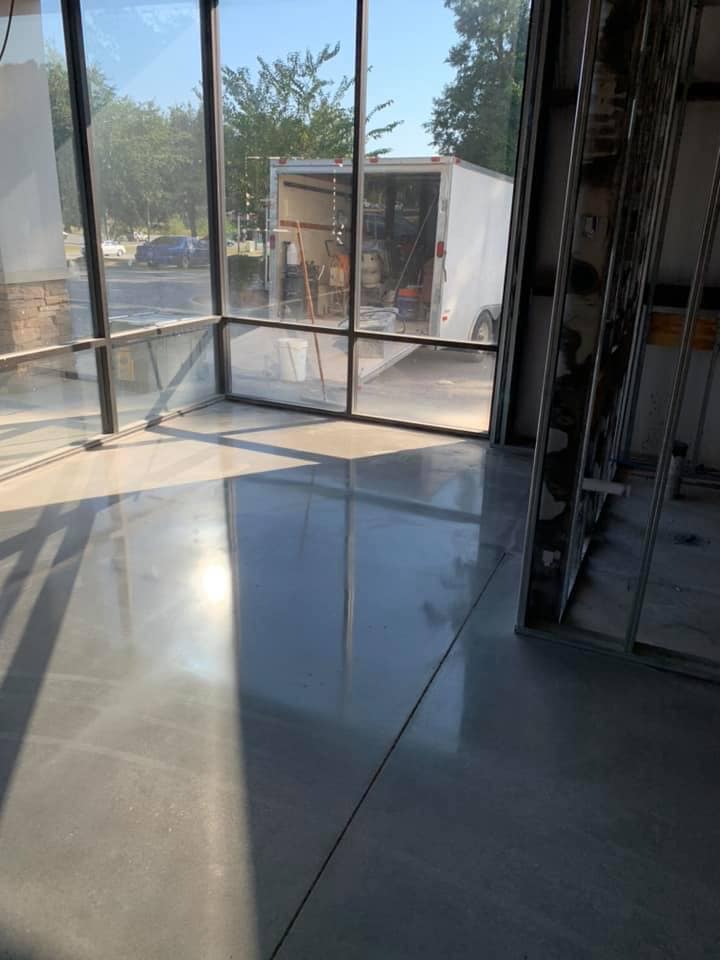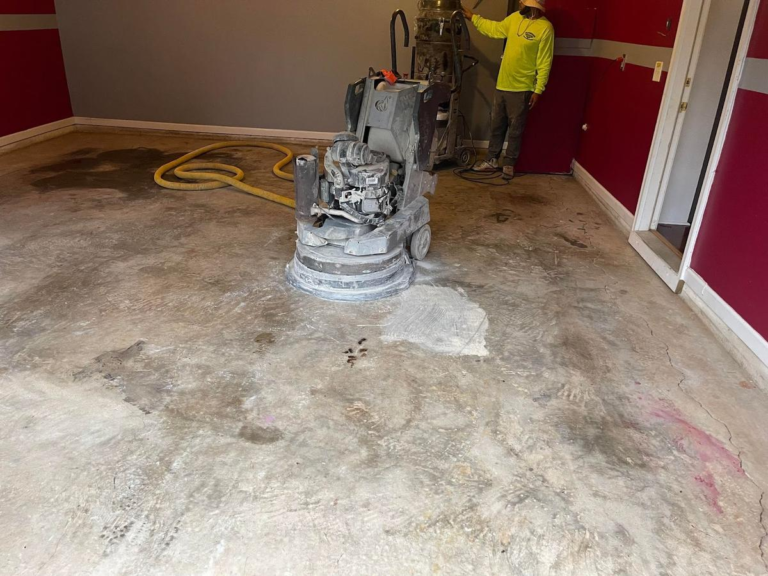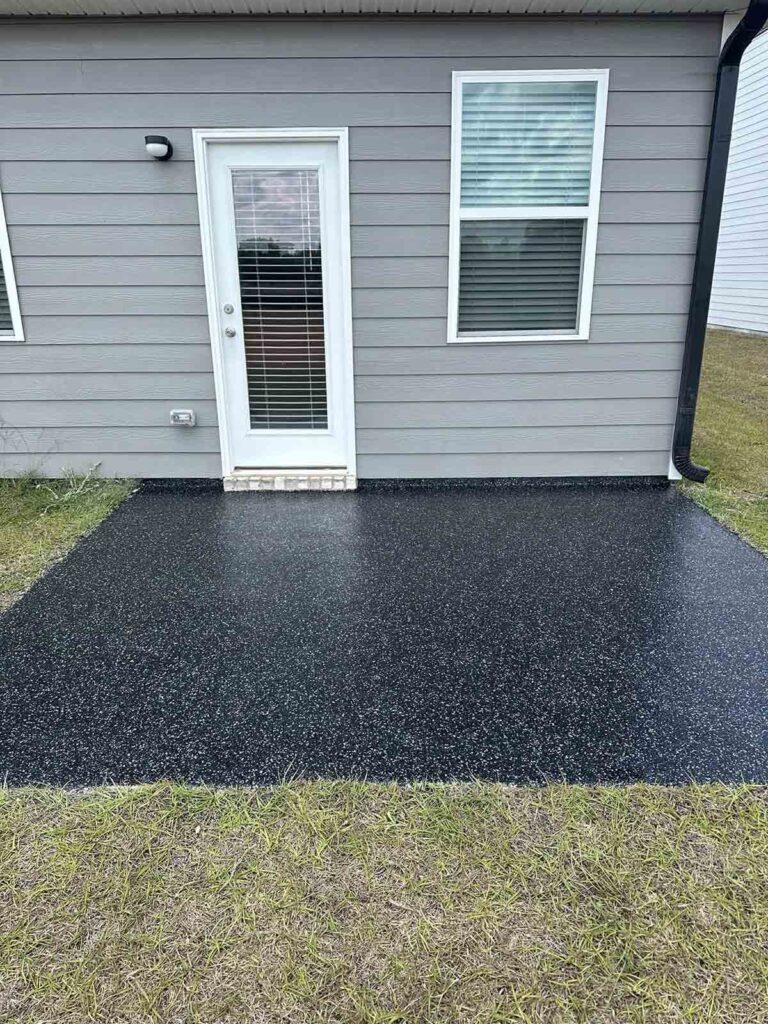Fill Out The Form To Save Up To $600
Main difference between Epoxy and Polyurea
When looking into options for garage floor coatings, many people want to weigh the pros and cons of the products being used.
Which is better for your floor, Epoxy or Polyurea?
What is the difference between Epoxy and Polyurea?
This article breaks down the (chemist verified facts) on Epoxy vs. Polyurea.
Let’s start with some shared benefits.
- Both form a strong bond (adheres to your concrete).
- Both are hot-tire pickup resistant.
- Both are chemical-resistant & easy to clean.
- Both have UV-Resistant properties.
- Both retain traction when wet.
- Both have extremely low VOCs.
- Both are Antibacterial & Kid/Pet Safe.
- Both are stronger than concrete.
Now, let’s break down some differences.
Cure Time Facts.
Polyurea dries within 4 – 6 hours of application (okay for light foot traffic).
You can typically drive on it within 24 hours of application (once fully cured).
Epoxy dries within 24 hours of application (okay for light foot traffic).
You can typically drive on it within 75 – 96 hours of application (once fully cured).
Why so much of a difference?
The technology of a Polyurea base coat simply cures much faster, which also makes for a great selling point.
“Coat your floor in 1-day and park your car back in the garage in as little as 24 hours!”
But is there a downside to this quick cure time?
Let’s start by understanding that concrete is porous, meaning it can easily absorb liquids & chemicals.
Your floor is prepped by hardness-specific diamond grinders that put it in its most pure & porous state – which is now ready for the basecoat!
What makes properly installed epoxy garage floor coating special is the products are able to “seep & soak” into your surface, adhering and becoming one with your concrete slab.
So now that we know let’s look back at the cure times.
With Polyurea curing within 4 – 6 hours, it has a small timeframe to “seep & soak,” whereas Epoxy is still curing a total of 48 hours after application!
With this fact in mind, it is clear that Polyurea will never have as strong of adhesion as Epoxy, as it simply cures too fast to fully adhere and penetrate all pores as thoroughly as Epoxy does.
When it comes to curing times, Polyurea is a clear winner.
When it comes to adhesion and MAX strength for your slab, Epoxy takes the prize.
Vapor Resistance.
What is vapor resistance, and why does it matter?
It is a fact that Polyurea does not have the same vapor-resistant properties as Epoxy (compound for compound).
Most Polyurea basecoats only tolerate around 6 lbs of moisture, whereas Epoxy (depending on the brand) can handle upwards of 2x as much moisture.
(In addition, some Epoxy comes pre-mixed with moisture barriers.)
What does this mean?
A Polyurea floor will generally have to be upsold to include an additional moisture barrier. In contrast, Epoxy either comes with a moisture barrier pre-added or already contains sufficient moisture resistance for that specific concrete slab’s application.
What happens if you opt for a Polyurea basecoat without a moisture barrier?
It might be okay for a few months or even a few years, but if any moisture does start to seep through your slab, you could be left with bad news in the future.
Exposure to moisture will cause the coating to reject (delamination) and require a complete grind and re-coat.
If you DO opt for Polyurea, be sure that:
1 – Your area is proven to have no moisture issues
2 – You ask your installer to include a moisture barrier
(Installers will commonly opt for no moisture barrier if they suspect none is needed, as it is faster & most cost-effective.)
Always remember that it is much more expensive to remove a failed coating than it is to coat a bare slab, so be sure you make the right choice the first time!
Field Testing.
Should you choose Epoxy or Polyurea?
Epoxy Resins have been around for close to 100 years!
In the United States, Epoxy coatings have been used commercially since 1946.
Now, compare Polyurea, invented in the 1980s and didn’t become popularized for industrial-grade floor coatings until the last couple of decades.
When looking at both products objectively, there are Epoxy floors that have been installed and holding strong for multiple decades, whereas there are very few Polyurea floors that have been installed for upwards of 15 years. Meaning?
Epoxy has been tried, field-tested, and proven true for decades longer than polyurea, as a compound itself has undergone much more refinement. Epoxy has simply been around longer and installed in many more conditions than Polyurea has been exposed to.
When it comes to strength, adhesion, & moisture resistance, Epoxy is the clear winner.
Benefits Of Polyurea.
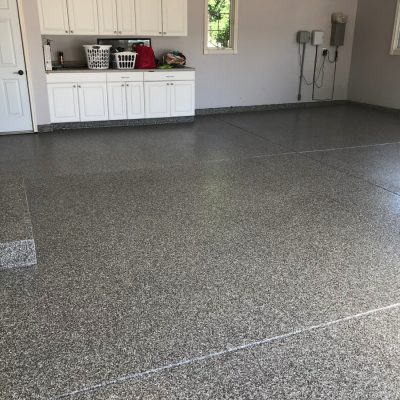
Are Polyurea coatings good or bad?
Truthfully, they are great!
There are three key benefits that Polyurea has over Epoxy.
Cure Time Of Polyurea.
If you’re experiencing a time restraint, or need the absolute quickest return to service, then Polyurea may be your best option, as you can have a fully cured floor within 24 hours that is then ready for service.
Polyurea might be the best choice for your installation, depending on your situation.
Temperature Requirements.
Polyurea has a much broader installation temperature spectrum than Epoxy.
Polyurea can be installed in temperatures as low as -30 degrees Fahrenheit, which may be more suitable in Northern states with very cold climates. At the same time, Epoxy can’t be installed in freezing temperatures.
If you’re in a colder climate where Epoxy can not possibly be installed, then Polyurea is your best bet without question.
Chemical Makeup
Polyurea has more than 50% of the elongation properties of Epoxy, making it far more superior against crack resistance.
Polyurea can deal with lower temperature fluctuations and is more flexible in these conditions.
Benefits of Epoxy.
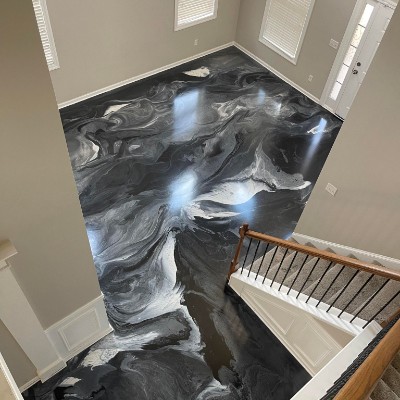
Are Epoxy floor coatings good?
Will an Epoxy coating work on my garage?
Epoxy coatings are great for garage floors!
There are three key benefits that Epoxy has over Polyurea.
Adhesion
Due to the much slower cure time of Epoxy, it can create a much stronger bond to your concrete surface, making it the preferred choice for max-strength on your garage floor.
Vapor resistance.
Epoxy is substantially more vapor resistant than Polyurea.
With the ability to handle up to 2x the moisture that Polyurea can, Epoxy is the clear choice for anyone that may want to avoid any moisture-related issues in the future.
Time tested.
The fact that Epoxy has been around for many more decades than Polyurea, it is simply unmatched in its advancement (as a product) as a whole.
Epoxy itself has gone through several chemical refinements, making it stronger, more flexible, and more durable than ever before.
Polyurea will need several more years of field testing to catch up to where Epoxy currently is in the spectrum of its abilities.
In Conclusion
This educational article is 100% unbiased and designed for any homeowner or future installer to make the best decision possible for their upcoming project(s).
Both coatings are great options; if you are in a Northern state where temperatures drop below zero and need to bring your vehicles inside within 24 hours, Polyurea is the way to go. If you are in a warmer state and want the most moisture security and the best bond between your concrete and base coat, Epoxy is the answer.
Depending on your project and area, it’s best to make the most informed decision. Do your research to ensure you have an everlasting floor.
Blankenship Polished Concrete Services
If you have any questions, please contact us at 678) 296-8826.

